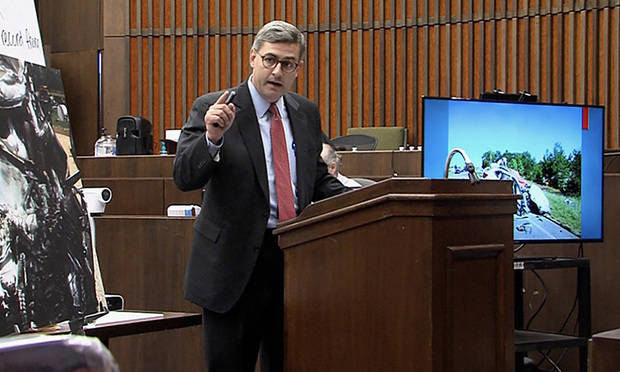How a Columbus, Ga., Jury Returned a $280M Verdict in 45 Minutes
The jury awarded $150 million for the value of the life of Judy Madere, and $30 million for her pain and suffering, plus $100 million in punitive damages and $65,000 in attorney fees.
August 24, 2019 at 06:20 PM
8 minute read
 Brandon Peak of Butler Wooten & Peak makes closing argument for Madere v. Schnitzer in Muscogee County State Court. (Courtesy photo)
Brandon Peak of Butler Wooten & Peak makes closing argument for Madere v. Schnitzer in Muscogee County State Court. (Courtesy photo)
A jury in Columbus, Georgia, returned a $280 million verdict Friday against a trucking company whose driver crossed the center line and killed five members of a family traveling together.
The weeklong trial before Muscogee County State Court Judge Andy Prather was for the death of Judy Madere, 58, who was riding in the backseat of a Nissan Rogue SUV buckled in between her grandchildren, 4-year-old Jaxson and 7-year-old Trinity. Her daughter, Carrie Jones—the children's mother—was driving. Judy Madere's twin sister, Trudy Hebert, was sitting up front next to her niece. They all died when the tractor-trailer carrying a bin of scrap metal came into their lane and hit them head on, according to court records.
The jury awarded $150 million for the value of the life of Judy Madere, and $30 million for her pain and suffering, plus $100 million in punitive damages and $65,000 in attorney fees.
The trucking company, Georgia-based Schnitzer Southeast, admitted liability for the at-fault driver's negligence. The parent company, publicly traded Schnitzer Steel Industries of Portland, Oregon, denied responsibility. But the jury held that the two companies were operating as a joint venture, and that the driver was an agent of both.
"I think the verdict was a reflection of the quality of our client as much as the mean spirited nature of the defense," said Brandon Peak of Butler Wooten & Peak, lead counsel for Judy Madere's husband Larry and surviving daughter Anjanette Thomas. "Not a single time did the defense apologize for the wreck or for taking Judy Madere's life. Not a single time."
Peak said a low point was when the lead defense counsel suggested in closing that Carrie Jones, Judy Madere's daughter, could have done more to get out of the truck's way. "The jury was visibly repulsed by that," Peak said.
Peak tried the case with partner Joel Wooten. The winning team also included: LaRae Dixon Moore of Page Scrantom Sprouse Tucker & Ford in Columbus; Chris McDaniel and Ramsey Prather of Butler Wooten & Peak; paralegal Marci Martinez; IT specialist Ray Davis; investigators Nick Giles and AB Calhoun; and legal assistants Heather Byrd and Ginger Busby. Butler Wooten & Peak has offices in Columbus, Atlanta and Savannah.
The jury had a verdict after about 45 minutes of deliberation, Wooten said.
"It's a horror story," Wooten said. "It's a family's worst nightmare."
Peak and Wooten represent the survivors not only of Judy Madere but the four others killed along with her. They said Saturday that one case is still pending in Muscogee County Superior Court. That one is for Madere's twin sister. The others for the children and their mother have been resolved with confidential settlements.
Wooten said Peak handled the opening statement and closing argument, plus most everything else. "He is a great young lawyer and a great person," Wooten said of Peak. "He did a wonderful job."
Peak said he was "thankful and appreciative of the jurors who gave meaning to Judy's life and recognized that it is not OK for a large corporation to ignore safety rules and put unsafe trucks and unsafe drivers on the roadway."
The family's lawyers presented evidence to show braking skid marks for the SUV but none for the truck. And they alleged that the companies were linked so closely that when the driver applied for his job with Schnitzer Southeast, he filled out an application to Schnitzer Steel.
Schnitzer's lead counsel was Bobby Shannon of Baker Donelson. His team included Mark Barber and Ciera Locklair of Baker Donelson. Also present at the defense table was appellate attorney Laurie Webb Daniel of Holland & Knight.
"Schnitzer plans to appeal because we believe that the trial was riddled with error," Daniel said Saturday.
Peak disagreed, saying, "We don't think there are any errors whatsoever. Judge Prather tried a clean case."
Shannon said there's more to the story than what the jury knew.
"We certainly understand the anger of the jury," Shannon said Sunday. "In post-trial discussions with jurors, they felt that we never took responsibilities or apologized for the accident. That was inaccurate. We tried to apologize after the accident. We were rebuffed. Counsel for the plaintiffs moved to exclude any apologies during the trial."
Shannon expressed frustration over his client being accused of putting a fatigued driver on the road. "The driver was on vacation for four days prior," Shannon said. "The morning of the accident was his first day back at work."
Shannon said the verdict was used in a symbolic way for more than this case at hand.
"They also wanted to send us a message to deter my client's behavior. We were precluded from talking about the significant changes Schnitzer put into place after the accident. Also, they heard lots of evidence about the loss of five family members. Plaintiff's Counsel told the jurors in closing this was the only trial. They weren't told there were five separate suits or three of the five cases were settled–two of them settled almost a year ago."
And Shannon said he believes jurors were biased by local news coverage of the trial. "In addition, I believe the nightly television broadcast that contained inflammatory inaccuracies impacted the jury," he said.
A corporate contact for Schnitzer Steel sent the Daily Report a statement Saturday, attributable to Schnitzer Southeast.
"We continue to extend our deepest condolences to all affected by this tragic accident that occurred in 2016. Schnitzer Southeast has accepted responsibility for this accident, and we were hoping for a fair and reasonable outcome for all parties. Unfortunately, we believe the jury's verdict has significant flaws, and we plan to appeal it," the company said.
"Operational safety is a core value for Schnitzer Steel and each of its subsidiaries, and we work every day to ensure a safe working environment for our employees and the communities we serve. Working with Schnitzer Steel, we review our safety policies and procedures on an ongoing basis to minimize the risk of accidents of any type going forward. Our safety and logistics practices and procedures include transportation safety management, including process review to ensure compliance with safety guidelines, partnerships with local law enforcement to provide enhanced training for drivers, and installation of dashboard cameras in all of our vehicles," the company said.
In a summary for the consolidated pretrial order, the defense said the driver swerved to miss a dog.
But Wooten said said no one else saw a dog in the road July 18, 2016.
The Madere attorneys alleged the driver was fatigued, having only slept less than five hours the night before. They said he fell asleep, crossed the center line of the two-lane U.S. Highway 80 in Alabama just outside of Columbus and slammed into the SUV.
Wooten said the trial was so emotional that he was crying.
"Judy was described as the rock of the family, the matriarch. She and Larry raised their two girls to do right and study hard," Wooten said. "They always tried to do the right thing."
Judy and Larry Madere had been married for 42 years. Testimony included their first meeting at a high school dance, Wooten said. Larry Madere saw her and asked the boy next to him, "Who is that girl?"
"She's my girlfriend," the other boy said.
"I want to dance with her," Larry Madere said.
"That'll be a dollar a dance," the boy joked.
Larry Madere answered, "Here's $5. I'm gonna dance with her all night."
Wooten said he thought the testimony of a co-worker from the school cafeteria was particularly moving. She said Larry Madere drove Judy Madere to work every day, even though they only lived a short distance from the school. "I've been there," Wooten said. "You could walk it easily."
"Judy like powdered sugar donuts," Wooten said. "Larry would send her a bag of powdered donuts with a love note inside."
Wooten said he thought the defense miscalculated when one of their attorneys asked Larry Madere how much longer he thought Judy Madere would have worked.
"It's not about the paycheck. It's all about the intangible things people do," Wooten said. "Apparently the jury agreed."
The case is Madere v. Schnitzer, No. SC17CV106.
This content has been archived. It is available through our partners, LexisNexis® and Bloomberg Law.
To view this content, please continue to their sites.
Not a Lexis Subscriber?
Subscribe Now
Not a Bloomberg Law Subscriber?
Subscribe Now
NOT FOR REPRINT
© 2025 ALM Global, LLC, All Rights Reserved. Request academic re-use from www.copyright.com. All other uses, submit a request to [email protected]. For more information visit Asset & Logo Licensing.
You Might Like
View All
Law Firms Expand Scope of Immigration Expertise Amid Blitz of Trump Orders
6 minute read
Bass Berry & Sims Relocates to Nashville Office Designed to Encourage Collaboration, Inclusion
4 minute read
Gunderson Dettmer Opens Atlanta Office With 3 Partners From Morris Manning
3 minute read
Trending Stories
- 1Uber Files RICO Suit Against Plaintiff-Side Firms Alleging Fraudulent Injury Claims
- 2The Law Firm Disrupted: Scrutinizing the Elephant More Than the Mouse
- 3Inherent Diminished Value Damages Unavailable to 3rd-Party Claimants, Court Says
- 4Pa. Defense Firm Sued by Client Over Ex-Eagles Player's $43.5M Med Mal Win
- 5Losses Mount at Morris Manning, but Departing Ex-Chair Stays Bullish About His Old Firm's Future
Who Got The Work
J. Brugh Lower of Gibbons has entered an appearance for industrial equipment supplier Devco Corporation in a pending trademark infringement lawsuit. The suit, accusing the defendant of selling knock-off Graco products, was filed Dec. 18 in New Jersey District Court by Rivkin Radler on behalf of Graco Inc. and Graco Minnesota. The case, assigned to U.S. District Judge Zahid N. Quraishi, is 3:24-cv-11294, Graco Inc. et al v. Devco Corporation.
Who Got The Work
Rebecca Maller-Stein and Kent A. Yalowitz of Arnold & Porter Kaye Scholer have entered their appearances for Hanaco Venture Capital and its executives, Lior Prosor and David Frankel, in a pending securities lawsuit. The action, filed on Dec. 24 in New York Southern District Court by Zell, Aron & Co. on behalf of Goldeneye Advisors, accuses the defendants of negligently and fraudulently managing the plaintiff's $1 million investment. The case, assigned to U.S. District Judge Vernon S. Broderick, is 1:24-cv-09918, Goldeneye Advisors, LLC v. Hanaco Venture Capital, Ltd. et al.
Who Got The Work
Attorneys from A&O Shearman has stepped in as defense counsel for Toronto-Dominion Bank and other defendants in a pending securities class action. The suit, filed Dec. 11 in New York Southern District Court by Bleichmar Fonti & Auld, accuses the defendants of concealing the bank's 'pervasive' deficiencies in regards to its compliance with the Bank Secrecy Act and the quality of its anti-money laundering controls. The case, assigned to U.S. District Judge Arun Subramanian, is 1:24-cv-09445, Gonzalez v. The Toronto-Dominion Bank et al.
Who Got The Work
Crown Castle International, a Pennsylvania company providing shared communications infrastructure, has turned to Luke D. Wolf of Gordon Rees Scully Mansukhani to fend off a pending breach-of-contract lawsuit. The court action, filed Nov. 25 in Michigan Eastern District Court by Hooper Hathaway PC on behalf of The Town Residences LLC, accuses Crown Castle of failing to transfer approximately $30,000 in utility payments from T-Mobile in breach of a roof-top lease and assignment agreement. The case, assigned to U.S. District Judge Susan K. Declercq, is 2:24-cv-13131, The Town Residences LLC v. T-Mobile US, Inc. et al.
Who Got The Work
Wilfred P. Coronato and Daniel M. Schwartz of McCarter & English have stepped in as defense counsel to Electrolux Home Products Inc. in a pending product liability lawsuit. The court action, filed Nov. 26 in New York Eastern District Court by Poulos Lopiccolo PC and Nagel Rice LLP on behalf of David Stern, alleges that the defendant's refrigerators’ drawers and shelving repeatedly break and fall apart within months after purchase. The case, assigned to U.S. District Judge Joan M. Azrack, is 2:24-cv-08204, Stern v. Electrolux Home Products, Inc.
Featured Firms
Law Offices of Gary Martin Hays & Associates, P.C.
(470) 294-1674
Law Offices of Mark E. Salomone
(857) 444-6468
Smith & Hassler
(713) 739-1250






